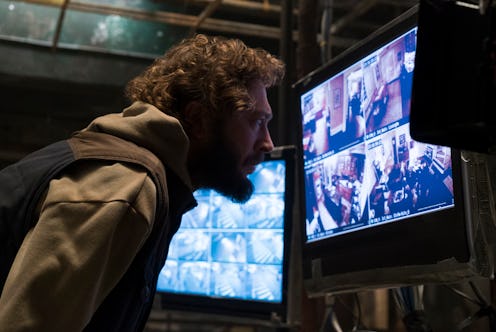Entertainment
How Micro’s Surveillance In ‘The Punisher’ Disregards His Family’s Right To Privacy

For most of The Punisher Season 1, the Lieberman family are haunted by the ghost of their father. David, who goes by the codename Micro in The Punisher isn't a literal ghost, but he may as well be. Spoilers! While his wife and children mourn his (faked) death, David, played by Ebon Moss-Bachrach, watches them from his bunker, through surveillance cameras he's hidden in his former home. He even sends Frank Castle to check up on them in person, serving as a short-term father figure for David's children. David's invasive surveillance on The Punisher complicates a character who is otherwise framed as a "good guy" in the Marvel series.
While many comic book stories are focused solely on the battle between good and evil, morality is a lot more complicated in The Punisher. David seems to be a good person, dedicating his life to taking down government corruption and exposing suspicious paramilitary activities. But the way he goes about his life raises some questions. David clearly has a moral code, but where does spying on his family fall into that? Should David have left his family behind when he faked his own death? David's surveillance of his family may have saved their lives, but it also violates their privacy so intensely that the show makes a joke of him lying to them about it after they're reunited.
Speaking over the phone before the show's mid-November premiere, Moss-Bachrach calls Micro's spying "questionable for sure, but at the same time I completely understand." As the actor sees it, David's choice to monitor his family comes from a place of fear and loneliness. "I mean, he’s been living in this basement for over a year and he’s just so damn lonely. I mean, I think [he's willing to do] anything he can do," he says.
Where Frank Castle had his family taken away from him, David was taken away from his family, and he knows that re-entering their lives would put them all in grave danger. David's motivations for monitoring his family are understandable, but also may just be a guise for David's own selfish needs.
For a series that is filled with blood and gore, some of the most cringe-worthy scenes in The Punisher come from simply seeing Frank in the Lieberman house. As the camera cuts from Frank talking to Sarah to David watching their interactions on a screen, it certainly doesn't feel like David is trying to protect the people he loves. David is using Frank to vicariously be a father, only to end up feeling jealous when his ex-wife begins to develop feelings for Frank. It's a classic case of "be careful what you wished for," as David probably would have felt better if he had simply let his family live their lives until he was able to safely return to them.
"I think [David's] feelings about the surveillance are, you do it, you feel guilty, or you do it and it doesn’t make you feel any better," Moss-Bachrach says. "You feel worse. You feel more lonely and even more powerless."
While monitoring his family does provide David with the knowledge that they are safe, trying to live his own life from afar eventually begins to drive him down a dark path. He starts showing up at their house, watching Frank play ball with his son from around the corner. So though the series doesn't directly pass judgment on David's violation, his choices certainly come back to bite him.
David may have been able to justify the choice to bug his family in his own head, but the decision proves to be as emotionally damaging to him as it is ethically questionable. Moss-Bacharach declares it "a desperate act of communion, and a desperate flawed act of communion."
As a character, David proves that even if you have the intentions of a hero, your actions may not always line up with that, because you're a fallible person. The Punisher follows many characters who are trying to do the right thing in a wrong way, and David shows that you don't need to be a violent vigilante to travel far past the line of what is ethical.
Additional reporting by Sage Young